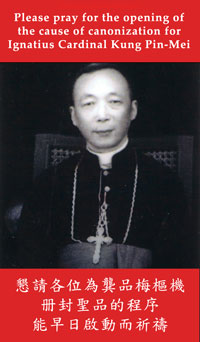The Persecution of the Underground Roman Catholic Church in China
Testimony of Joseph M. C. Kung, President
March 25, 2002
![]()
The Cardinal Kung Foundation
presented to The Congressional-Executive Commission on China
Room SD 215 Dirksen Senate Building 1st/Constitution N.E. Washington, D.C.
![]()
Ladies and Gentlemen:
When I entered this country forty-seven years ago in 1955, China was a young communist country. At that time, the communists were throwing the bishops, priests and their faithful into jail and labor camp.
Forty-seven years later, China is still a communist country. China is still throwing the religious believers into jail and labor camp by thousands. Although China has changed by opening its door to the outside world, the persecution of religious believers has never stopped. This persecution has recently become so bad at a time when China is making significant economic progress, at a time when China has joined World Trade Organization, and at a time when China professes fighting terror, while it continues to create its own terror among its own religious believers.
Since late 1999, the government of China has destroyed 1,200 churches in one eastern province alone. An 82 year old priest, Father YE Gong-Feng was savagely tortured to unconsciousness and Father LIN Rengui was beaten so savagely that he vomited blood. Underground Catholic seminarian Wang Qing was tortured for three days, being suspended by his wrists, beaten, and forced fed with contaminated liquids that caused severe injury and illness. Catholic priest Hu Duo suffered broken legs in police beatings. Even a 12 year old girl could not escape the brutality. She told the interrogators that she had become a liturgy lector. As a result, she was beaten so savagely that she had to be hospitalized.
There is a tiny village called Dong Lu in Hebei. In that village, there is a shrine for the Blessed Mother. Each year, tens of thousands of pilgrims visited this shrine from all over China. However, in May 1996, 5,000 Chinese soldiers, supported by dozens of armed cars and helicopters, destroyed and leveled that shrine. The government confiscated the statue of the Blessed Virgin Mary and arrested many bishops and priests. Bishop Su Chimin, the underground bishop of this shrine, was arrested at least 5 times in the past and had already spent approximately 26 years in prison. He disappeared after he was last arrested in October, 1997. We do not even know if he is dead or alive. The auxiliary bishop of this shrine, Bishop An Shuxin, was last arrested in May, 1996. He has been in prison for the last 6 years. We do not even know where he is. The pastor of this shrine, Father Cui Xingang, was also arrested 6 years ago in May, 1996.
There are approximately 50 bishops in the underground Roman Catholic Church. Almost every one of them is either arrested, or under house arrest, or under strict surveillance, or in hiding, or on the run. For instance, Bishop Jia Zhiguo, Bishop of Zhengding in Hebei, was just arrested 5 days ago. We do not know where he is.
Obviously, there is severe on-going persecution of underground Roman Catholic in China at this time.
The communists took over China in 1949. After 7 years of severe persecution, the communists failed to stamp out the Catholic Church. So, in 1957, the Chinese communist government created its own church called the Chinese Catholic Patriotic Association - in order to replace the Roman Catholic Church in China and to have complete control of the church.
Although this Patriotic Association's Church calls itself "Catholic", it does not take its mandate from the Pope. It takes orders only from the Chinese Government. It is under the sanction of the Chinese government. Therefore, it is not persecuted. To this day, the Patriotic Association continues to openly advocate independence from the Pope. Our Pope has refused to recognize this Patriotic Association, or the "Official Church".
In contrast, underground Roman Catholics have no public churches in China because they are illegal there. A Holy Mass, a prayer service, and even praying over the dying by Roman Catholics are all considered illegal and subversive activities by the Chinese government. Religious services for the Roman Catholic Church can only be secretly conducted in private homes or deserted fields. The Chinese government deems these private gatherings of Roman Catholics as illegal, unauthorized, subversive and punishable by exorbitant fines, detention, house arrests, jails, labor camps, or even death.
Approximately five months ago, Chinese government authorities arrested underground Bishop Lucas Li of Feng Xiang and 18 underground priests, and closed an underground monastery and two underground convents. The reason? The Patriotic Association was coming to town.
The government is now forcing underground Roman Catholics to register with the Patriotic Association Refusing to do so is now liable to sentencing to three years' labor camp.
Being ordained as an underground Roman Catholic priest and conducting evangelization without permission from the Chinese government are now also considered a crime punishable by three years in the labor camps. This punishment is illustrated in a court paper dated April 13, 2001 and is attached at the back of my speech.
Let me say few words about Cardinal Kung. In fact, no description of the persecution of religious believers is complete without mentioning him, because he is a symbol of persecution in China.
Cardinal Kung was the Bishop of Shanghai for 51 years until he died two years ago on March 12. He was imprisoned for thirty-two and one-half years, mostly under solitary confinement, because he refused to renounce the Pope. Pope John Paul II secretly created Bishop Kung a Cardinal in 1979 while he was still in jail and proclaimed him publicly a Cardinal twelve years later in 1991 after he arrived in the United States. Cardinal Kung lived in the United States for 12 years. When Cardinal Kung received his red hat in the Vatican, he received an unprecedented 7-minutes standing ovation from 7,500 people. When he died, the Pope called him "this noble son of China and of the Church."
In an interview with the Chinese Press in New York on February 12, 1998, Mr. Ye Xiaowen, the director of the Religious Bureau of China, stated: "Kung Pin Mei committed a serious crime by dividing the country and causing harm to its people." One month later in March 1998, the Chinese government confiscated the passport of this then 97 year old Cardinal Kung, officially exiling him and making him stateless.
Why is the Chinese communist government so fearful of this 97-year-old Cardinal that it had to confiscate his passport to prevent his return to China? Even after his death, Cardinal Kung was still persecuted and insulted by the Chinese government. After the Cardinal's death, the Chinese government issued a statement that "Kung Pin Mei was a criminal of China found guilty by the Chinese court. Kung committed a serious crime of dividing the country and dividing the church. History will judge him for his crime." I believe that history will indeed judge. However, history will judge that Cardinal Kung is not a criminal. History will also judge that those religious believers who have been persecuted by the Chinese government are also not criminals. The criminals will be those who sent Cardinal Kung to life imprisonment. The criminals will be those who have been persecuting millions of Chinese religious believers who only want to practice their religion according to their conscience, not according to the choice of the government. The criminal will obviously be the Beijing government.
Thank you.




